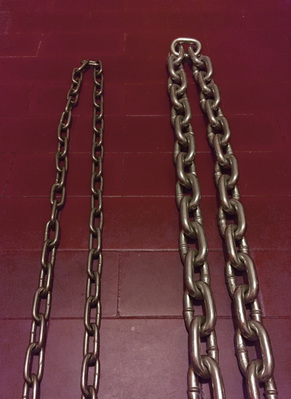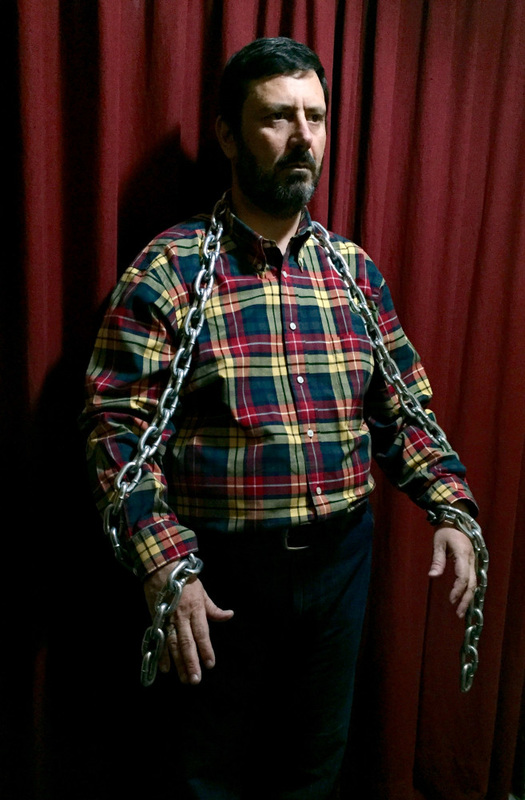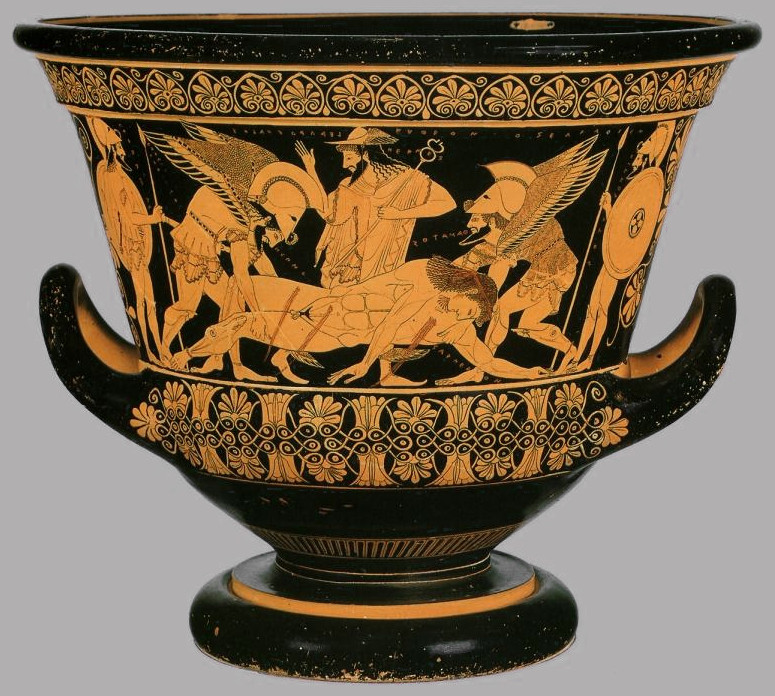Gods on ancient Greek tragedy
Panos Mavitzis
Philosophically
In the ancient Greek philosophy, the Universe in all its levels, is dominated by the “Divine Law” which is “One”.
The “One Divine Law” is an experiential goal and an object of research, both for all the Mysteries of the world and for the modern science of Astrophysics.
The “One Divine Law” can be approached only experientially and not theoretically.
Philosophy teaches us that the “One Divine Law” divided itself into “aspects”, which the science of Psychology calls Archetypes. Each Archetype constitutes one of the “aspects” of the “One Divine Law”.
The “totality” of the Archetypes manifests into the “One divine Law”.
Each Archetype constitutes a complete Unity and executes an independent action, both in the structure and the operation of the Universe.
Plato in his work “Timaeus” mentions that the “Immortal Gods” express the “aspects” of the “One Divine Law”.
The “Immortal Gods” of the ancient Greek Religion are the symbols of the Archetypes, i.e. the symbols of the “aspects” of the “One Divine Law”.
When the “One Divine Law” manifests itself, everyone bows. And this is a rule with no exception.
When the Immortal Gods express themselves, then an “aspect” of the “One divine Law” manifests itself.
The mortal beings respect the “One Divine Law”, because they do not possess the Knowledge of the “Law of Cause and Effect”, i.e. the Knowledge of the “One Divine Law”.
The wisest of the Sages (Socrates), when he taught on the matter of the “One Divine Law” / “Law of Cause and Effect” he mentioned: “I know one thing: that I know nothing”. Socrates was condemned to mortal death, winning at the same time Divine immortality.
Mortals respect the “Immortal Gods”, just like they respect the “One Divine Law” and this sense of respect has been infused into the ancient Greek tragedy.
The mythological history of each “Immortal God” reveals the properties of the “aspect” of the “One Divine Law”, which is expressed every time the “Immortal God” (Archetype) appears.
The “One Divine Law” traced through a purely human point of view, manifests it self unchanged and thus sometimes it is experienced as ruthless. But the “Divine Plan” must be implemented in its entirety, initially for the creation and afterwards for the regular functioning of the Universe.
The “One Divine Law”, i.e. the Word of the “Immortal Gods” cannot be altered by human emotional fluctuations.
Theatrically
The Roles of Gods express the Light of the “One Divine Law”, which is of Heavenly origin.
When an “Immortal God” appears on stage, it must be made clear by his presence that:
There shouldn’t be any confusion between a stout/solid acting expression and a flat/isotonic presence on stage, even if at first glance they might appear identical.
The whole of the actor’s body should be tense and not intense, so that it emits high energy and this energy must be so strong, so that it expresses the Primordial Energy, both of the “Divine Plan” and of the process of the “Universe’s Creation”. The direction of this energy must always be as the “One Divine Law” has ordained in the tragedy’s plot.
The actor’s presence on stage, on the one hand should signify that the “Immortal God” does not mingle with the “earthly things”, but on the other that he is in full contact with the here and now of the plot and not detached from the events of the play, although at first glance it might seem so.
The Role of the “Immortal God” is not soulless; on the contrary it contains all the emotions in a dynamic balance, without being in a state of emotional withdrawal, expressing emptiness. Just like the spectrum of the iris composes white light, so does the psychism of the Role of the “Immortal God” vibrate by all the emotions.
Sometimes, in the written text of the tragedies, the Word of the Roles of the “Immortal Gods” is emotionally charged. It must be made clear that these emotional charges do not express the psychic vibration of the “aspect” of the “One Divine Law”, but the psychic projections that the mortals make when they come face to face with the manifestation of the “Law of Cause and Effect”. Thus, the existence of emotional charges in the Word of the “Immortal Gods” should not alter the expression of the actor.
The psychism of the actors who embody Roles of “Immortal Gods”, must be intensely and dynamically balanced and function as a mirror, in order to reflect the psychism of the actors who play the Roles of mortals and direct it on to the viewers, in order to mobilize their own psychic aspects.
In certain tragedies, Demi-Gods or Heroes appear in Roles who express the “One Divine Law”. In such cases the actor must have the same acting expression as the one described above for the roles of the “Immortal Gods”.
A Directorial Encouragement
Place a chain around the back of the neck of the actor, who is going to embody the “Immortal God”.
The chain must be heavy enough, so that the actor feels the weight of the “aspect” of the “One Divine Law”, which he is about to enact. Choose chains of different weights for men and women respectively.
Wrap the chain around the wrists of the actor, so that he feels the importance of the action he is about to announce. The chain must be long enough, so as to reach as far down as the genitals of the actor.
Go through all the rehearsals in this way, so that the chain moves as little as possible, harmonically and without making any noise.
A common mistake
The Caduceus is the symbol of Hermes and the God always holds it so that wherever he reveals himself, everyone understands his existence.
However, when Hermes appears, the Caduceus, which he holds in his hand, does not have wings. The wings symbolize the God himself and thus when he is present, his symbol does not appear with him.
Furthermore, whoever talks on behalf of Hermes, i.e. relays the Word of God, holds the Caduceus as well. In such a case the Caduceus has wings, which suggest that everything that is said, is as if the God himself said them.
In the ancient Greek philosophy, the Universe in all its levels, is dominated by the “Divine Law” which is “One”.
The “One Divine Law” is an experiential goal and an object of research, both for all the Mysteries of the world and for the modern science of Astrophysics.
The “One Divine Law” can be approached only experientially and not theoretically.
Philosophy teaches us that the “One Divine Law” divided itself into “aspects”, which the science of Psychology calls Archetypes. Each Archetype constitutes one of the “aspects” of the “One Divine Law”.
The “totality” of the Archetypes manifests into the “One divine Law”.
Each Archetype constitutes a complete Unity and executes an independent action, both in the structure and the operation of the Universe.
Plato in his work “Timaeus” mentions that the “Immortal Gods” express the “aspects” of the “One Divine Law”.
The “Immortal Gods” of the ancient Greek Religion are the symbols of the Archetypes, i.e. the symbols of the “aspects” of the “One Divine Law”.
When the “One Divine Law” manifests itself, everyone bows. And this is a rule with no exception.
When the Immortal Gods express themselves, then an “aspect” of the “One divine Law” manifests itself.
The mortal beings respect the “One Divine Law”, because they do not possess the Knowledge of the “Law of Cause and Effect”, i.e. the Knowledge of the “One Divine Law”.
The wisest of the Sages (Socrates), when he taught on the matter of the “One Divine Law” / “Law of Cause and Effect” he mentioned: “I know one thing: that I know nothing”. Socrates was condemned to mortal death, winning at the same time Divine immortality.
Mortals respect the “Immortal Gods”, just like they respect the “One Divine Law” and this sense of respect has been infused into the ancient Greek tragedy.
The mythological history of each “Immortal God” reveals the properties of the “aspect” of the “One Divine Law”, which is expressed every time the “Immortal God” (Archetype) appears.
The “One Divine Law” traced through a purely human point of view, manifests it self unchanged and thus sometimes it is experienced as ruthless. But the “Divine Plan” must be implemented in its entirety, initially for the creation and afterwards for the regular functioning of the Universe.
The “One Divine Law”, i.e. the Word of the “Immortal Gods” cannot be altered by human emotional fluctuations.
Theatrically
The Roles of Gods express the Light of the “One Divine Law”, which is of Heavenly origin.
When an “Immortal God” appears on stage, it must be made clear by his presence that:
- He is aware of the Cause and Effect of his presence and his Word must bring about that specific Effect.
- He is fully conscious of all the levels of all the events of the story’s plot.
- He speaks on behalf of the “One Divine Law”.
There shouldn’t be any confusion between a stout/solid acting expression and a flat/isotonic presence on stage, even if at first glance they might appear identical.
The whole of the actor’s body should be tense and not intense, so that it emits high energy and this energy must be so strong, so that it expresses the Primordial Energy, both of the “Divine Plan” and of the process of the “Universe’s Creation”. The direction of this energy must always be as the “One Divine Law” has ordained in the tragedy’s plot.
The actor’s presence on stage, on the one hand should signify that the “Immortal God” does not mingle with the “earthly things”, but on the other that he is in full contact with the here and now of the plot and not detached from the events of the play, although at first glance it might seem so.
The Role of the “Immortal God” is not soulless; on the contrary it contains all the emotions in a dynamic balance, without being in a state of emotional withdrawal, expressing emptiness. Just like the spectrum of the iris composes white light, so does the psychism of the Role of the “Immortal God” vibrate by all the emotions.
Sometimes, in the written text of the tragedies, the Word of the Roles of the “Immortal Gods” is emotionally charged. It must be made clear that these emotional charges do not express the psychic vibration of the “aspect” of the “One Divine Law”, but the psychic projections that the mortals make when they come face to face with the manifestation of the “Law of Cause and Effect”. Thus, the existence of emotional charges in the Word of the “Immortal Gods” should not alter the expression of the actor.
The psychism of the actors who embody Roles of “Immortal Gods”, must be intensely and dynamically balanced and function as a mirror, in order to reflect the psychism of the actors who play the Roles of mortals and direct it on to the viewers, in order to mobilize their own psychic aspects.
In certain tragedies, Demi-Gods or Heroes appear in Roles who express the “One Divine Law”. In such cases the actor must have the same acting expression as the one described above for the roles of the “Immortal Gods”.
A Directorial Encouragement
Place a chain around the back of the neck of the actor, who is going to embody the “Immortal God”.
The chain must be heavy enough, so that the actor feels the weight of the “aspect” of the “One Divine Law”, which he is about to enact. Choose chains of different weights for men and women respectively.
Wrap the chain around the wrists of the actor, so that he feels the importance of the action he is about to announce. The chain must be long enough, so as to reach as far down as the genitals of the actor.
Go through all the rehearsals in this way, so that the chain moves as little as possible, harmonically and without making any noise.
A common mistake
The Caduceus is the symbol of Hermes and the God always holds it so that wherever he reveals himself, everyone understands his existence.
However, when Hermes appears, the Caduceus, which he holds in his hand, does not have wings. The wings symbolize the God himself and thus when he is present, his symbol does not appear with him.
Furthermore, whoever talks on behalf of Hermes, i.e. relays the Word of God, holds the Caduceus as well. In such a case the Caduceus has wings, which suggest that everything that is said, is as if the God himself said them.



